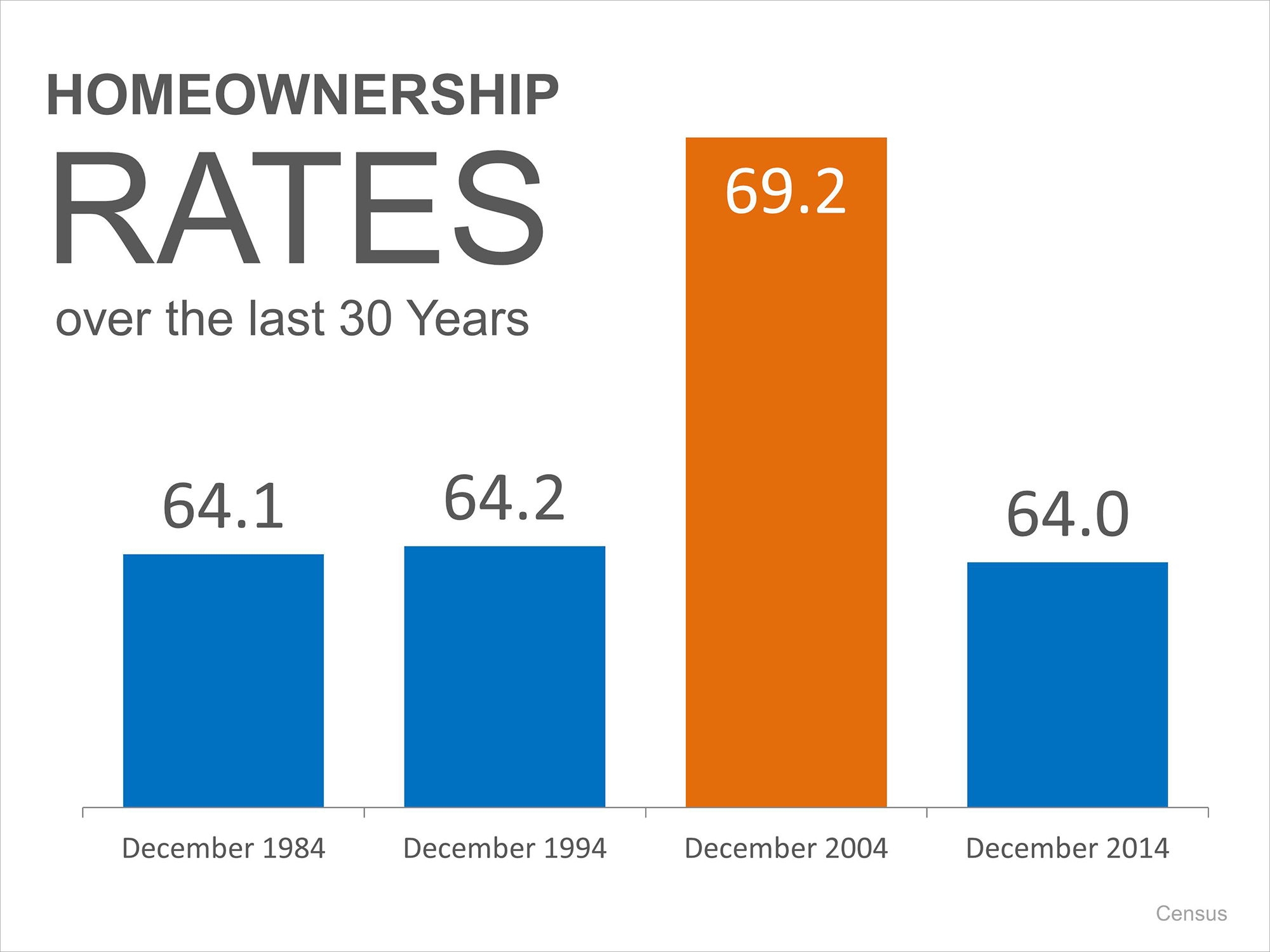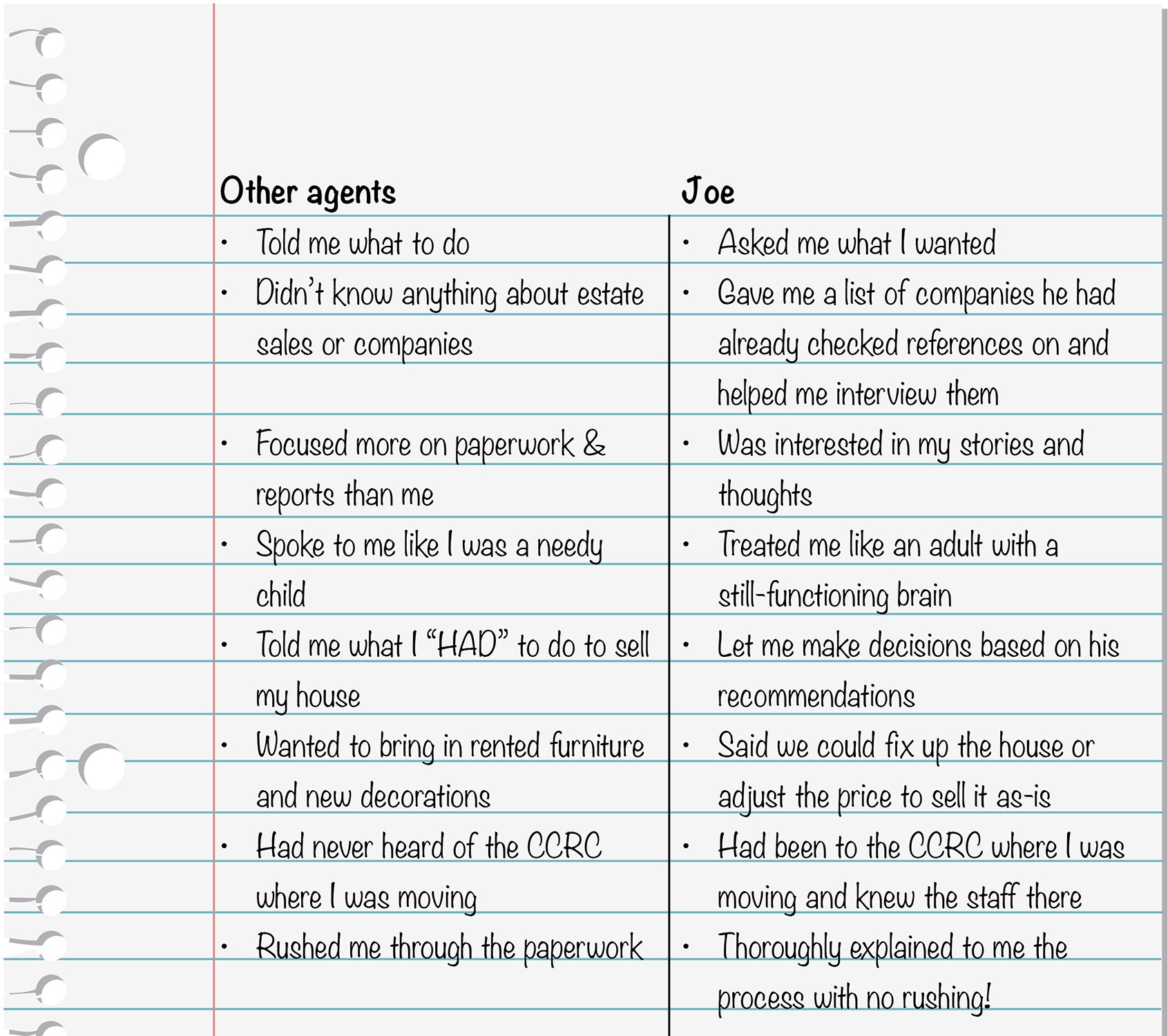- Vacation-home sales catapulted to an estimated 1.13 million last year
- This was the highest amount since NAR began the survey in 2003
- Vacation sales were up 57.4% from 717,000 in 2013
- Vacation-home sales accounted for 21 percent of all transactions in 2014, their highest market share since the survey was first conducted
New Search
If you are not happy with the results below please do another search
191 search results for: my dad
The National Association of Realtors just released their 2015 Investment and Vacation Home Buyers Survey which revealed that vacation home sales boomed in 2014 to above their most recent peak level in 2006.
NAR Chief Economist Lawrence Yun sai...
Homeownership Rates: Are They Really Crashing?
The Census recently released their 2014 Homeownership Statistics, and many began to worry that Americans have taken a step back from the notion of homeownership.
Easy… Chicken Little
The national homeownership rate peaked in 2004, representing ...
Why Have Interest Rates Dropped?
The headlines agree mortgage interest rates have dropped substantially below initial projections. Many who are considering purchasing a home, or moving up to their dream home, might think that they should wait to buy, because rates may continue t...
Debunking 4 Myths about Buying a Home
A recent study by the Joint Center for Housing Studies at Harvard University revealed when renters were asked why they do no plan to own in the future, financial constraints were a more common response than the perceived lifestyle benefits they m...
- FICO credit score from Fair Isaac Corporation/myfico.com, range 300 to 850
- Plus Score from Experian, range 320 to 830
- Trans Risk Score from TransUnion, range 300 to 850
- Equifax Credit Score from Equifax, range 300 to 850
- Vantage Score from all three bureaus, two ranges, 300 to 850 and 501-990
What is a FICO Score?
In 1958, Bill Fair and Earl Isaac, a mathematician and engineer, formed a company in San Rafael, California. They created tools to help risk managers make a better decision when taking financial risk. Today, 90 percent of all lenders use the FICO score, first created in 1989 by Fair Isaac, and it’s the only score Fannie Mae and Freddie Mac, the Federal Housing Agency and Veterans Affairs will accept in underwriting loans they guarantee.What is a Consumer Score?
The three credit bureaus, in their understanding of the credit scoring model created by FICO, decided to create their own scoring models, and in 2004 – 2006 they unveiled the “consumer” scores: Plus Score, Trans Risk Score, Equifax Credit Score, and Vantage Score. However, these are not genuine FICO scores, and mortgage lenders don’t use them. Consider this comparison: Would you buy a watch that gives the approximate time of day? The three credit bureaus work with major financial institutions, professional organizations, comparison sites, personal finance businesses, clubs such as Costco, AAA, Sam’s Club, and many data-mining brokers to bombard consumers in the race of the free credit score mania, all with the enticement of a “consumer” score that is not used by lenders, in hopes of obtaining subscriptions or fees from consumers. Fees that are totally unnecessary!Know Your Score
Gaining access to one’s own credit report and credit score prior to loan approval with no strings attached could be helpful, and at all times beneficial. With little effort, inaccuracy of information can be instantly corrected at the credit bureau level, and with a few simple steps, credit scores could be enhanced. For example, paying down revolving account balances before a creditor’s statement-ending date (the creditor later updates account information with the credit bureaus), thus reducing revolving account balances at a particular point in time, will positively add more points to a score. It’s priceless.More Information
Consumers have a legal right to access their annual credit report at no charge once a year from annualcreditreport.com, a site sponsored by the three major credit bureaus: Experian, Equifax and TransUnion. These reports provide all the basic consumer data, but do not reveal a credit score. If you have a need for the FICO credit score that is actually used by mortgage lenders, myfico.com is the website to visit. For $19.95 per bureau, consumers can purchase a customized credit report with a genuine FICO score. Additional websites to visit: the Federal Trade Commission (ftc.gov) and the Consumer Financial Protection Bureau (cfpb.gov) for true answers to questions about any financial concepts, financial products, dispute and complaint submissions, and much more. Today’s homebuyer has instant access to answers. To be relevant in today’s market, real estate professionals need to know the absolute correct response to basic credit questions. It’s important. Copyright 2014 Nabil Captan, Captan & Company. All rights reserved. [assets] => Array ( ) [can_share] => no [categories] => Array ( [0] => stdClass Object ( [category_type] => standard [children] => [created_at] => 2019-06-03T18:18:43Z [id] => 5 [name] => For Buyers [parent] => [parent_id] => [published_at] => 2019-06-03T18:18:43Z [slug] => buyers [status] => public [translations] => stdClass Object ( [es] => stdClass Object ( [name] => Para los compradores ) ) [updated_at] => 2019-06-03T18:18:43Z ) [1] => stdClass Object ( [category_type] => standard [children] => [created_at] => 2019-06-03T18:18:43Z [id] => 6 [name] => For Sellers [parent] => [parent_id] => [published_at] => 2019-06-03T18:18:43Z [slug] => sellers [status] => public [translations] => stdClass Object ( [es] => stdClass Object ( [name] => Para los vendedores ) ) [updated_at] => 2019-06-03T18:18:43Z ) ) [content_type] => blog [contents] => Today we are excited to have Nabil Captan as our guest blogger. Nabil is a nationally recognized credit scoring expert, educator, author and producer. In today’s post, he explains how what you don’t know about your credit score could end up costing you. Enjoy!
Informed consumers considering a home purchase today want to do the right thing and plan ahead. Many do not seek immediate professional guidance from a Realtor or a mortgage loan officer. Instead, they hunt for hours online, looking at numerous websites for available homes for sale. They also consult websites to find the best interest rate and terms for future monthly mortgage payments. Many consumers feel betrayed, cheated and at times embarrassed to learn that the credit scores they counted on, to get that specific interest rate for their loan, are not used by mortgage lenders.
When shopping for a good mortgage interest rate, consumers also need to know their credit score, and utilize an online mortgage calculator to compute future monthly mortgage payments. A Google search for “credit score” will yield hundreds of results. The consumer accepts the provider’s terms and conditions to get a free credit score. Terrific! Unaware that in exchange they just received a meaningless credit score that lenders never use. They also handed over their Non-Public Personal Information (NPPI) to that credit score provider for life.
Before we go any further, let’s look at available credit scoring products available to consumers today:
Today we are excited to have Nabil Captan as our guest blogger. Nabil is a nationally recognized credit scoring expert, educator, author and producer. In today’s post, he explains how what you don’t know about your credit score could end up costing you. Enjoy!
Informed consumers considering a home purchase today want to do the right thing and plan ahead. Many do not seek immediate professional guidance from a Realtor or a mortgage loan officer. Instead, they hunt for hours online, looking at numerous websites for available homes for sale. They also consult websites to find the best interest rate and terms for future monthly mortgage payments. Many consumers feel betrayed, cheated and at times embarrassed to learn that the credit scores they counted on, to get that specific interest rate for their loan, are not used by mortgage lenders.
When shopping for a good mortgage interest rate, consumers also need to know their credit score, and utilize an online mortgage calculator to compute future monthly mortgage payments. A Google search for “credit score” will yield hundreds of results. The consumer accepts the provider’s terms and conditions to get a free credit score. Terrific! Unaware that in exchange they just received a meaningless credit score that lenders never use. They also handed over their Non-Public Personal Information (NPPI) to that credit score provider for life.
Before we go any further, let’s look at available credit scoring products available to consumers today:
- FICO credit score from Fair Isaac Corporation/myfico.com, range 300 to 850
- Plus Score from Experian, range 320 to 830
- Trans Risk Score from TransUnion, range 300 to 850
- Equifax Credit Score from Equifax, range 300 to 850
- Vantage Score from all three bureaus, two ranges, 300 to 850 and 501-990
What is a FICO Score?
In 1958, Bill Fair and Earl Isaac, a mathematician and engineer, formed a company in San Rafael, California. They created tools to help risk managers make a better decision when taking financial risk. Today, 90 percent of all lenders use the FICO score, first created in 1989 by Fair Isaac, and it’s the only score Fannie Mae and Freddie Mac, the Federal Housing Agency and Veterans Affairs will accept in underwriting loans they guarantee.What is a Consumer Score?
The three credit bureaus, in their understanding of the credit scoring model created by FICO, decided to create their own scoring models, and in 2004 – 2006 they unveiled the “consumer” scores: Plus Score, Trans Risk Score, Equifax Credit Score, and Vantage Score. However, these are not genuine FICO scores, and mortgage lenders don’t use them. Consider this comparison: Would you buy a watch that gives the approximate time of day? The three credit bureaus work with major financial institutions, professional organizations, comparison sites, personal finance businesses, clubs such as Costco, AAA, Sam’s Club, and many data-mining brokers to bombard consumers in the race of the free credit score mania, all with the enticement of a “consumer” score that is not used by lenders, in hopes of obtaining subscriptions or fees from consumers. Fees that are totally unnecessary!Know Your Score
Gaining access to one’s own credit report and credit score prior to loan approval with no strings attached could be helpful, and at all times beneficial. With little effort, inaccuracy of information can be instantly corrected at the credit bureau level, and with a few simple steps, credit scores could be enhanced. For example, paying down revolving account balances before a creditor’s statement-ending date (the creditor later updates account information with the credit bureaus), thus reducing revolving account balances at a particular point in time, will positively add more points to a score. It’s priceless.More Information
Consumers have a legal right to access their annual credit report at no charge once a year from annualcreditreport.com, a site sponsored by the three major credit bureaus: Experian, Equifax and TransUnion. These reports provide all the basic consumer data, but do not reveal a credit score. If you have a need for the FICO credit score that is actually used by mortgage lenders, myfico.com is the website to visit. For $19.95 per bureau, consumers can purchase a customized credit report with a genuine FICO score. Additional websites to visit: the Federal Trade Commission (ftc.gov) and the Consumer Financial Protection Bureau (cfpb.gov) for true answers to questions about any financial concepts, financial products, dispute and complaint submissions, and much more. Today’s homebuyer has instant access to answers. To be relevant in today’s market, real estate professionals need to know the absolute correct response to basic credit questions. It’s important. Copyright 2014 Nabil Captan, Captan & Company. All rights reserved. [created_at] => 2014-09-24T06:00:28Z [description] => Today we are excited to have Nabil Captan as our guest blogger. Nabil is a nationally recognized credit scoring expert, educator, author and producer. In today’s post, he explains how what you don’t know about your credit score could end up costi... [expired_at] => [featured_image] => https:/// [id] => 136 [published_at] => 2014-09-24T10:00:28Z [related] => Array ( ) [slug] => what-you-dont-know-about-your-credit-score-could-cost-you [status] => published [tags] => Array ( ) [title] => What You Don't Know About Your Credit Score... Could Cost You! [updated_at] => 2014-10-08T15:14:43Z [url] => /2014/09/24/what-you-dont-know-about-your-credit-score-could-cost-you/ )What You Don't Know About Your Credit Score... Could Cost You!
Today we are excited to have Nabil Captan as our guest blogger. Nabil is a nationally recognized credit scoring expert, educator, author and producer. In today’s post, he explains how what you don’t know about your credit score could end up costi...
- Are home values approaching a new bubble or will prices continue to appreciate?
- Is it better for a first time buyer or a move-up buyer to wait until they save a bigger down payment before they purchase a home?
- Where will 30-year mortgage rates likely be in 12 months?
- Why do I need an agent when I can just as easily find the house online myself?
- Is buying a home still a good investment for my family?
 Whether you are buying or selling a home, the process can be challenging. That is why you should take on the services of a real estate professional when embarking on a potential home move. However, not all real estate agents are the same. A family must make sure they hire someone who truly understands the current housing market and, not only that, knows how to connect the dots to explain how market conditions may impact your decision.
How can you make sure you have an agent who meets these requirements?
Here are just a few questions every real estate professional should be able to answer for their clients and customers:
Whether you are buying or selling a home, the process can be challenging. That is why you should take on the services of a real estate professional when embarking on a potential home move. However, not all real estate agents are the same. A family must make sure they hire someone who truly understands the current housing market and, not only that, knows how to connect the dots to explain how market conditions may impact your decision.
How can you make sure you have an agent who meets these requirements?
Here are just a few questions every real estate professional should be able to answer for their clients and customers:
- Are home values approaching a new bubble or will prices continue to appreciate?
- Is it better for a first time buyer or a move-up buyer to wait until they save a bigger down payment before they purchase a home?
- Where will 30-year mortgage rates likely be in 12 months?
- Why do I need an agent when I can just as easily find the house online myself?
- Is buying a home still a good investment for my family?
5 Questions You Should Ask Your Real Estate Agent
Whether you are buying or selling a home, the process can be challenging. That is why you should take on the services of a real estate professional when embarking on a potential home move. However, not all real estate agents are the same. A famil...
A ‘Soft’ Housing Market? We Beg to Differ!
There are some pundits lamenting the softness of the 2014 housing market. We can’t understand why. Though it is true that the early part of the year disappointed because of a myriad of reasons (ex. weather, lack of inventory, less distressed sale...
Millennials: How Many are Actually ‘Living with their Parents’
Every day we are pleasantly surprised with the research coming forward regarding the Millennial generation. Whether it was the over-exaggeration of the student debt challenge, the misbelief that they are not yet ready to buy or the under estimati...
When Character is More Valuable than Competence
Today we are pleased to have Nikki Buckelew back as our guest blogger. Nikki is considered a leading authority on seniors real estate and housing. Enjoy!
It was her 80th birthday and as Sue's family gathered around in celebration, she announce...
- 58% of young-adult households have less than $10,000 in debt. An additional 18% have between $10,000 and $20,000
- 36% of households with people between the ages of 20 and 40 had education debt, up from 14% in 1989. Some of the increase stems from the good news that more people are going to college.
- Taking financial aid into account, the average tuition at private (nonprofit) colleges has not increased any faster than overall inflation over the last decade.
- Because the incomes of college graduates have grown since the early 1990s, the share of income that a typical student debtor has to devote to loan payments is only marginally higher than it was in the early 1990s — and somewhat lower than it was in late 1990s. It was 3.5% in 1992, 4.3% in 1998 and 4% in 2010.
- The burden for the people with the most debt is significantly lower today than two decades ago. Someone at the 90th percentile of debt had to devote 15% of their income to repayment in 2010, down from 20% in 1992.
 For almost a year now, we have been trying to debunk the myth that student debt is keeping the vast majority of Millennials from purchasing a home.
We explained that Millennials have purchased more homes over a recent twelve month period than any other generation as was reported by the National Association of Realtors).
We explained that the homeownership rate of people currently between the ages of 25-29 is 34.3%. That is higher than the 33.6% rate members of the previous generation (people currently between the ages of 45-49) achieved when they were that age (as per John Burns Consulting).
We explained that a recent survey showed that almost three out of every four (74%) young adults between the ages of 18-34 plan to buy a home in the next five years with 32% planning to do it in the next twelve months.
However, no matter how hard we tried, the same recourse was trumpeted back at us – What about student debt?
The good news is that the real facts about student debt are coming to light. Last week, The New York Times posted an article titled The Reality of Student Debt Is Different from the Clichés. This article went into great depth regarding the findings of a new study just released by the Brookings Institution, Is a Student Loan Crisis on the Horizon? which looked at data through 2010. The NYT article quoted key elements of the report:
For almost a year now, we have been trying to debunk the myth that student debt is keeping the vast majority of Millennials from purchasing a home.
We explained that Millennials have purchased more homes over a recent twelve month period than any other generation as was reported by the National Association of Realtors).
We explained that the homeownership rate of people currently between the ages of 25-29 is 34.3%. That is higher than the 33.6% rate members of the previous generation (people currently between the ages of 45-49) achieved when they were that age (as per John Burns Consulting).
We explained that a recent survey showed that almost three out of every four (74%) young adults between the ages of 18-34 plan to buy a home in the next five years with 32% planning to do it in the next twelve months.
However, no matter how hard we tried, the same recourse was trumpeted back at us – What about student debt?
The good news is that the real facts about student debt are coming to light. Last week, The New York Times posted an article titled The Reality of Student Debt Is Different from the Clichés. This article went into great depth regarding the findings of a new study just released by the Brookings Institution, Is a Student Loan Crisis on the Horizon? which looked at data through 2010. The NYT article quoted key elements of the report:
- 58% of young-adult households have less than $10,000 in debt. An additional 18% have between $10,000 and $20,000
- 36% of households with people between the ages of 20 and 40 had education debt, up from 14% in 1989. Some of the increase stems from the good news that more people are going to college.
- Taking financial aid into account, the average tuition at private (nonprofit) colleges has not increased any faster than overall inflation over the last decade.
- Because the incomes of college graduates have grown since the early 1990s, the share of income that a typical student debtor has to devote to loan payments is only marginally higher than it was in the early 1990s — and somewhat lower than it was in late 1990s. It was 3.5% in 1992, 4.3% in 1998 and 4% in 2010.
- The burden for the people with the most debt is significantly lower today than two decades ago. Someone at the 90th percentile of debt had to devote 15% of their income to repayment in 2010, down from 20% in 1992.
Millennials and Student Debt: We Knew They Were Wrong!
For almost a year now, we have been trying to debunk the myth that student debt is keeping the vast majority of Millennials from purchasing a home.
We explained that Millennials have purchased more homes over a recent twelve month period than ...
5 Reasons to Sell Now
Many sellers are still hesitant about putting their house up for sale. Where are prices headed? Where are interest rates headed? Can buyers qualify for a mortgage? These are all valid questions. However, there are several reasons to sell your ho...
FSBO Millionaires Use Real Estate Agents
We pride ourselves on the quality of real estate information we deliver each and every day. We try to gather empirical evidence to validate the positions we take. We do not use just an anecdotal story to make a point. We also do not get caught up in ...
Difference Between a ‘White Lie’ and Lying
Growing up it seemed ‘white lies’ were okay while lying was a sin. As children, we sometimes had difficulty understanding where the line was. As we matured, we realized there most definitely was a difference.
If a husband or wife asks if it is okay ...
Rethinking the 55+ Market
We are excited to have Nikki Buckelew back as our guest blogger for today. Nikki is considered a leading authority on seniors real estate and housing.
Someone said to me recently, “Sixty-five is the new forty-five.” We chuckled, but the more I th...
Millennials & Income
Today, Justin DeCesare returns as our guest blogger. Justin is the CEO of Middleton & Associates Real Estate in La Jolla, CA. - The KCM Crew
Millennials have become an important topic of discussion for media outlets and blogs throughout the C...
- In 2003, 34% were Spanish dominant, 44% English dominant, 22% bilingual
- In 2013, 31% were Spanish dominant, 31% English dominant, 38% bilingual
Where are they looking for homes?
This report revealed “62% of the Millennials prefer to live in the type of mixed-use communities found in urban centers where they live in close proximity to a mix of shopping, restaurants and offices. This is the first time since the 1920s where the growth in U.S. cities outpaces growth outside of the cities. And, 40 percent say they would like to live in an urban area in the future. The “American Dream” is transitioning from the white picket fence in the suburbs to the historic brownstone stoop in the heart of the city” and the markets with a major concentration of Millennials reflect this desire: Top 10 markets for Millennials (by %):- Austin, TX (16%)
- Salt Lake City, UT (15%)
- San Diego, CA (15%)
- Los Angeles, CA (14%)
- Denver, CO (14%)
- Washington, DC (14%)
- Houston, TX (14%)
- Las Vegas, NV (14%)
- San Francisco, CA (14%)
- Dallas-Ft. Worth, TX (14%)
 Nielsen recently released their report “Millennials – Breaking the Myths” and today I want to focus on the information reported about Hispanic Millennials.
Of the 77 million Millennials, 19% are Hispanic. This group (age 18-36) is the most racially and ethnically diverse than any previous generation. According to this report, Nielsen expects the Hispanic population to grow by 167% by 2050.
Millennials are 14% first generation, and 12% second generation Americans, keeping strong ties to their home country, culture and language. For example:
1. 63% of the Millennials feel it is their responsibility to care for an elderly parent, according to Nielsen: “this is partially tied to the ethnic diversity of the generation. Typically ‘Hispanic and Asian Americans’ have cultural expectations that elderly family members will be cared for by the younger generations.”
This can help you to understand why when a Hispanic Millennial is looking for a home, they are requesting that extra bedroom.
2. 65% of Hispanic Millennials are U.S. Born and are more bilingual than other generations
Nielsen recently released their report “Millennials – Breaking the Myths” and today I want to focus on the information reported about Hispanic Millennials.
Of the 77 million Millennials, 19% are Hispanic. This group (age 18-36) is the most racially and ethnically diverse than any previous generation. According to this report, Nielsen expects the Hispanic population to grow by 167% by 2050.
Millennials are 14% first generation, and 12% second generation Americans, keeping strong ties to their home country, culture and language. For example:
1. 63% of the Millennials feel it is their responsibility to care for an elderly parent, according to Nielsen: “this is partially tied to the ethnic diversity of the generation. Typically ‘Hispanic and Asian Americans’ have cultural expectations that elderly family members will be cared for by the younger generations.”
This can help you to understand why when a Hispanic Millennial is looking for a home, they are requesting that extra bedroom.
2. 65% of Hispanic Millennials are U.S. Born and are more bilingual than other generations
- In 2003, 34% were Spanish dominant, 44% English dominant, 22% bilingual
- In 2013, 31% were Spanish dominant, 31% English dominant, 38% bilingual
Where are they looking for homes?
This report revealed “62% of the Millennials prefer to live in the type of mixed-use communities found in urban centers where they live in close proximity to a mix of shopping, restaurants and offices. This is the first time since the 1920s where the growth in U.S. cities outpaces growth outside of the cities. And, 40 percent say they would like to live in an urban area in the future. The “American Dream” is transitioning from the white picket fence in the suburbs to the historic brownstone stoop in the heart of the city” and the markets with a major concentration of Millennials reflect this desire: Top 10 markets for Millennials (by %):- Austin, TX (16%)
- Salt Lake City, UT (15%)
- San Diego, CA (15%)
- Los Angeles, CA (14%)
- Denver, CO (14%)
- Washington, DC (14%)
- Houston, TX (14%)
- Las Vegas, NV (14%)
- San Francisco, CA (14%)
- Dallas-Ft. Worth, TX (14%)
Hispanic Millennials & Housing
Nielsen recently released their report “Millennials – Breaking the Myths” and today I want to focus on the information reported about Hispanic Millennials.
Of the 77 million Millennials, 19% are Hispanic. This group (age 18-36) is the most raciall...

 The National Association of Realtors just released their
The National Association of Realtors just released their  The Census recently released their 2014 Homeownership Statistics, and many began to worry that Americans have taken a step back from the notion of homeownership.
The Census recently released their 2014 Homeownership Statistics, and many began to worry that Americans have taken a step back from the notion of homeownership.

 The headlines agree mortgage interest rates have dropped substantially below initial projections. Many who are considering purchasing a home, or moving up to their dream home, might think that they should wait to buy, because rates may continue to fall.
A recent
The headlines agree mortgage interest rates have dropped substantially below initial projections. Many who are considering purchasing a home, or moving up to their dream home, might think that they should wait to buy, because rates may continue to fall.
A recent  A
A  There are some pundits lamenting the softness of the 2014 housing market. We can’t understand why. Though it is true that the early part of the year disappointed because of a myriad of reasons (ex. weather, lack of inventory, less distressed sales), the recent housing news is extremely encouraging. Let’s give some examples:
There are some pundits lamenting the softness of the 2014 housing market. We can’t understand why. Though it is true that the early part of the year disappointed because of a myriad of reasons (ex. weather, lack of inventory, less distressed sales), the recent housing news is extremely encouraging. Let’s give some examples:
 Every day we are pleasantly surprised with the research coming forward regarding the Millennial generation. Whether it was
Every day we are pleasantly surprised with the research coming forward regarding the Millennial generation. Whether it was 

 Many sellers are still hesitant about putting their house up for sale. Where are prices headed? Where are interest rates headed? Can buyers qualify for a mortgage? These are all valid questions. However, there are several reasons to sell your home sooner rather than later. Here are five of those reasons.
Many sellers are still hesitant about putting their house up for sale. Where are prices headed? Where are interest rates headed? Can buyers qualify for a mortgage? These are all valid questions. However, there are several reasons to sell your home sooner rather than later. Here are five of those reasons.
 Do as I Say… not as I Do
Do as I Say… not as I Do Growing up it seemed ‘white lies’ were okay while lying was a sin. As children, we sometimes had difficulty understanding where the line was. As we matured, we realized there most definitely was a difference.
Growing up it seemed ‘white lies’ were okay while lying was a sin. As children, we sometimes had difficulty understanding where the line was. As we matured, we realized there most definitely was a difference. Someone said to me recently, “Sixty-five is the new forty-five.” We chuckled, but the more I thought about it, the more I found myself in full agreement.
With more and more people working beyond traditional retirement age and the advances in modern medicine, the lines between middle and late adulthood are becoming a bit blurred.
Someone said to me recently, “Sixty-five is the new forty-five.” We chuckled, but the more I thought about it, the more I found myself in full agreement.
With more and more people working beyond traditional retirement age and the advances in modern medicine, the lines between middle and late adulthood are becoming a bit blurred.
 Millennials have become an important topic of discussion for media outlets and blogs throughout the Country. While some argue that my generation is blossoming later than our predecessors, optimists such as myself believe that with our rebounding economy will help Millennials finally arrive in the economic arena that allows them the growth potential generations before us were afforded.
While I truly believe Millennials are positioned to become an important force in the new economy, the widening economic policy that minimizes retirement accounts and creates underemployment of Millennials threatens what is now America’s largest demographic.
Millennials have become an important topic of discussion for media outlets and blogs throughout the Country. While some argue that my generation is blossoming later than our predecessors, optimists such as myself believe that with our rebounding economy will help Millennials finally arrive in the economic arena that allows them the growth potential generations before us were afforded.
While I truly believe Millennials are positioned to become an important force in the new economy, the widening economic policy that minimizes retirement accounts and creates underemployment of Millennials threatens what is now America’s largest demographic.
